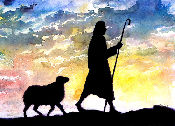Keathley The Supremacy of the Person of Christ is a single chapter module from a larger work. This chapter is on the Person and Work of Jesus Christ.
7. The Supremacy of the Person of Christ (Col. 1:15-18)
Outline Review
I. Doctrinal: The Person and Work of Christ (1:1-23)
B. The Supremacy of the Person of Christ (1:15-18)
1. His Relation to God (1:15)
2. His Relation to Creation (1:16-17)
3. His Relation to the Church (1:18)
15 He is the image of the invisible God, the firstborn over all creation, 16 for all things in heaven and on earth were created by him—all things, whether visible or invisible, whether thrones or dominions, whether principalities or powers—all things were created through him and for him. 17 He himself is before all things and all things are held together in him. 18 He is the head of the body, the church, as well as the beginning, the firstborn from among the dead so that he himself may become first in all things.
Download “Keathley-III-The-Supremacy-of-the-Person-of-Christ.gbk_.twm”
Keathley-III-The-Supremacy-of-the-Person-of-Christ.gbk_.twm – Downloaded 34 times – 27.00 KBIntroduction
From his prayerful concern that the Colossians might walk in a manner fitting to their new life in Christ, the apostle moves quickly into the main focus of this epistle—the exaltation and preeminence of Christ in His person and work. Part of the reason was the false teaching confronting the Colossians, but another reason is because nothing is more vital for experiencing the power of Christ and fruitfulness than an accurate understanding of both the person and work of Jesus Christ. Without truly understanding who Jesus really is and what He alone could and did accomplish through the cross, people become sitting ducks for cultic systems or false religious beliefs that seek to come to God other than exclusively through the Lord Jesus Christ. Always, all false belief systems either reject what the Bible teaches about the person of Christ (deny His deity or true humanity), or they seek to add something to the work of Christ (add some system of religious or ascetic works), or they will do both—subtract from His person and add to His work. In other words, what Christ accomplished on the cross is not sufficient, so some system of works is added as a means of true spirituality and access to God. This is precisely what the false teachers at Colossae were doing. As mentioned in the introductory material to this commentary, these false teachers apparently represented an early system of Gnosticism that would eventually take two forms, one ascetic (some type of religious self-denial) and the other licentious (lacking moral restraint). This philosophy included a Greek form of dualism that believed all matter was evil and that only pure spirit was good. The ascetics taught that the way to overcome the body, which is evil, was by self-abasement and severe treatment of the body. Compare Paul’s warning about “touch not, taste not” in Colossians 2:20-23. The licentious group taught just the opposite—that since the body was evil and only matter, it didn’t make any difference what you did with it, or they would advocate that unbridled licentiousness was the only way to rid the body of its evil.
More Works on Christology
- Gill John – Messiah
- Glover, T.R. – Jesus of History
- Gordon – A Quiet Talk about the Babe of Bethlehem
- Gordon – Quiet Talks about Jesus
- Hall, Newman – Lord’s Prayer
- Harsha Christ and Him Crucified
- Harsha, David – Star of Bethlehem, a Guide to the Savior
- Hocking, W.J. – Son of His Love
- Hodge A.A. The Person of Christ
- Hodge, Charles – Systematic Theology (3 Vol in 1 Module) 1.0
- Keathley The Supremacy of the Person of Christ
- Kingsley, Charles – Good News of God
- Krummacher The Suffering Savior
- Luginbill – Christology Study of Christ
Keathley The Supremacy of the Person of Christ

Bible Study on the biblical concept of Pastor is a short Bible Study on the biblical concept of Pastor. I look at the concept in the Bible in general terms and make observations.
Topics: Introduction | Where does "pastor" occur in the Bible | Why is there so much polemic about it? | Why is there so much polemic about it? | But, where is the problem really and truthfully?
Excerpt: Let's make the observation that the concept of a "pastor" is a verb. It means a person who takes spiritual care of people as a shepherd takes physical care of sheep. The word nor concept of "cowboy" ever occurs in the Bible. The difference of concepts is great between the two. See ch51 Cowboys versus Shepherds. Part of the problem here is that bad pastors are usually great, dynamic public relations people who know how to emotionally work people to get what they want. Excellent pastors follow Jesus and are meek and humble of spirit, so they don't toot their own horns.
Read the Article: Bible Study on the biblical concept of Pastor.